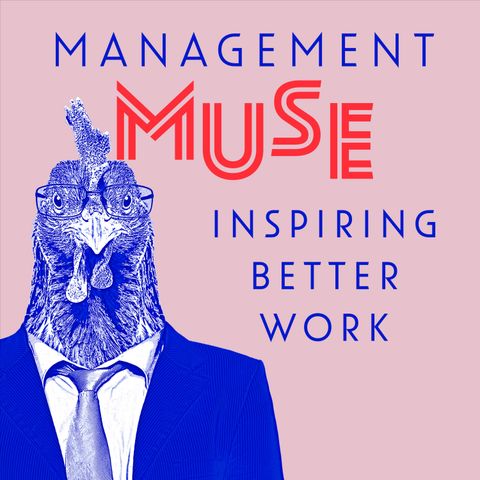30 MAY 2023 · In this episode of Management Muse, outer space expert and Earthling extraordinaire Joe Guzman shares his unique perspective on managerial risk and decision making. Uncertainty looms large in risk taking, since decisions with certain outcomes aren’t risky at all. The good news is that managers can often take risks incrementally by experimenting with small decisions and running pilot studies to see what happens before going all in. Risk, reward, and failure are usually interconnected, but with some forethought and wisdom from experiences managers can learn when to most appropriately turn smart risk on. Strap into your chair because in this episode space cowboy Joe Guzman takes us on a lively ride.
Episode Highlights:
• Joe emphasizes the importance of failure and humility in understanding risk and highlights timeless lessons from Stoicism, including embracing failures as part of the growth process.
• Cindi, Joe, and Geoff discuss the significance of calibrating risk when possible, and talk about the dangers of too much success leading to a bulletproof gambler illusion. Good feedback and reflection processes also help us learn practical and important lessons from failures.
• Geoff, Cindi, and Joe discuss some key factors the impact risk-taking, including openness to experience, the situation, our personal strategy, our age, and Kahneman and Tversky’s prospect theory (which states that individuals may take bigger risks after experiencing losses).
• The gang discuss the importance of morals and principles as guideposts for risky decisions.
• Cindi, Joe, and Geoff talk about what fear can and can’t teach us about our decisions.
• When possible, experiment and start small to reduce some uncertainty and test larger decisions.
• Without risk, too much of our potential is left on the table. A fulfilling life requires risk, failure, reward, and learning.
Quotes:
“Every challenge in your life makes you into the person you are now.” -Joe Guzman
“You’ve got to be willing to fail if you're going to take risks.” -Cindi Baldi
“A meaningful life has a well-calibrated acceptance of risk.” -Geoffrey Tumlin
“You're going to get into trouble if you don't fail and if you are missing feedback mechanisms.” -Geoffrey Tumlin
“A lot of times we don't have to predict. We should just experiment.” -Geoffrey Tumlin
About Joe Guzman:
Joe Guzman is the founder of Space Cowboy. He also went to high school and college with Geoff. He retired from the Army's Space Force as a Colonel.
Resources:
Selected works from Nassim N. Taleb:
Taleb, Nassim N. (2017). Skin in the game. Penguin Books.
Taleb, Nassim N. (2013). Antifragile. Penguin Books. T
aleb, Nassim N. (2008). The black swan. Penguin Books.
Ryan Holiday’s Daily Stoic Podcast: https://dailystoic.com/podcast/ Amor Fati is Latin for “the love of fate” https://dailystoic.com/amor-fati-love-of-fate/
Selected work from Daniel Kahneman and Amos Tversky (and Paul Slovic):
Kahneman, D., Slovic, P. & Tversky, A. (1982). Judgment under Uncertainty: Heuristics and Biases. Cambridge: Cambridge University Press. Kahneman, Daniel. (2011).
Thinking, fast and slow. Farrar, Straus and Giroux. Principles by Ray Dalio: Dalio, Ray. (2017). Principles: life and work. Simon and Schuster.
Key words: Risk, fear, risk management, failure, feedback, decision making


